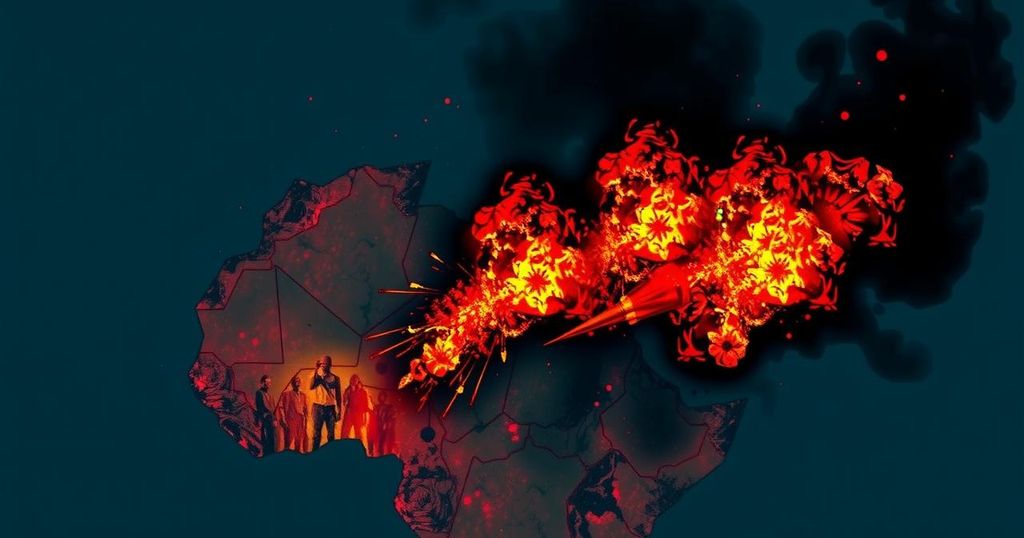Renewed Violence in Eastern DRC Raises Alarms in Angola
Renewed conflicts in the eastern Democratic Republic of Congo (DRC) have heightened concerns from the Angolan government, which seeks to mediate a lasting ceasefire and has condemned the resurgence of violence as a violation of previous agreements. With ongoing clashes occurring, particularly involving the M23 rebel group, the humanitarian situation remains dire, with predictions of increasing displacement among civilians. Angola continues to lead diplomatic efforts aimed at restoring peace in the region, emphasizing the importance of adhering to ceasefire agreements.
The resurgence of hostilities in the eastern Democratic Republic of Congo (DRC) has prompted serious concerns from the Angolan government, particularly as Luanda actively seeks a sustainable ceasefire. Following a month-long period of decreased violence, recent clashes have emerged, which the Angolan government deems a blatant breach of the principles established during the ministerial meeting on July 30 and the ceasefire that commenced on August 4. In a statement issued on Tuesday, Angola expressed its dismay at the renewed violence, which it characterized as a direct challenge to ongoing peace efforts aimed at restoring stability in the region. The Angolan government has been involved in diplomatic mediation between the DRC and Rwanda, who have each accused the other of supporting insurgent groups that threaten their national security. In their last meeting held in Luanda two weeks ago, both nations reiterated their commitment to pursuing a peaceful solution. The DRC has committed to preventing support for the FDLR rebels, who pose a threat to Rwanda, but has conditioned this agreement on Rwanda’s cessation of backing for the M23 insurgents. In response to the recent clashes, Angola has condemned the violence, calling on the conflicting parties to adhere to the established ceasefire as reaffirmed in the ministerial meeting of September 14. Reports of violent confrontations on Sunday and Monday highlight the escalating conflict around the village of Kalembe, where the Wazalendo self-defense group, allied with the Congolese army, clashed with M23 forces. Notably, a former member of parliament, Juvenal Munubo, stated that support from the Congolese army played a role in the recovery of control over Kalembe by the NDC Rénové group. Munubo further expressed concerns regarding the intentions of the rebels in attempting to seize control over additional provinces in the region. Despite the ongoing hostilities, the DRC government has refrained from engaging in discussions with the M23, while negotiations continue with the Rwandan government to address relevant security matters. The diplomatic dialogue is part of a broader framework agreed upon during the fifth meeting of the foreign ministers of both countries on October 12, focusing on finalizing security arrangements encapsulated in a draft peace agreement. Angola has underscored the necessity of avoiding actions that could escalate the conflict, thereby exacerbating the already severe humanitarian crisis facing eastern DRC. The country remains committed to facilitating a long-term resolution to the tension through the Luanda Process, led by President João Lourenço, with backing from the African Union. As violence persists, reports indicate that around 14 civilians sustained injuries, forcing many to flee their homes. The United Nations High Commissioner for Human Rights predicts that 2024 may witness an additional 940,000 people displaced, culminating in nearly seven million displaced individuals within the DRC. The impacts of the conflict have resulted in extreme overcrowding and grave human rights abuses, including incidents of sexual violence.
The Eastern Democratic Republic of Congo has been plagued by conflict and instability for decades, with various armed groups vying for control over territory and resources. Neighbouring countries, particularly Rwanda and Angola, have often been involved in mediation efforts due to the cross-border implications of these conflicts. Angola has taken a proactive role in facilitating dialogue between the DRC and Rwanda to seek a peaceful resolution to the crises that have occasionally escalated into open conflict. The establishment of ceasefires and agreements amongst the conflicting parties remains an ongoing challenge, particularly with the presence of known rebel groups like the M23 and FDLR.
In summary, the renewed fighting in the eastern DRC represents a significant setback in ongoing peace efforts led by Angola, which has sought to mediate conflicts between the DRC and Rwanda. The Angolan government has condemned the resumption of violence as a violation of past agreements and has called for adherence to the ceasefire. As hostilities continue, the humanitarian impact remains alarming, with millions of civilians at risk of displacement and severe rights violations. The situation underscores the urgent need for effective diplomatic resolutions and the commitment of all parties to sustaining peace in the region.
Original Source: www.theeastafrican.co.ke




Post Comment